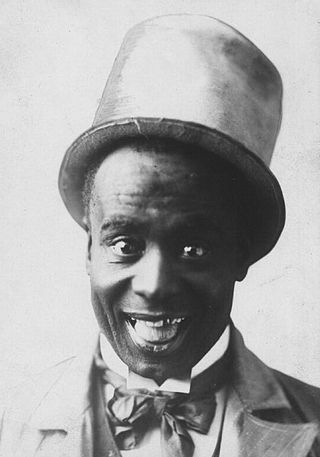Pop music is a genre of popular music that originated in its modern form during the mid-1950s in the United States and the United Kingdom. The terms popular music and pop music are often used interchangeably, although the former describes all music that is popular and includes many disparate styles. During the 1950s and 1960s, pop music encompassed rock and roll and the youth-oriented styles it influenced. Rock and pop music remained roughly synonymous until the late 1960s, after which pop became associated with music that was more commercial, ephemeral, and accessible.
Ragtime, also spelled rag-time or rag time, is a musical style that flourished from the 1890s to 1910s. Its cardinal trait is its syncopated or "ragged" rhythm. Ragtime was popularized during the early 20th century by composers such as Scott Joplin, James Scott and Joseph Lamb. Ragtime pieces are typically composed for and performed on piano, though the genre has been adapted for a variety of instruments and styles. "Maple Leaf Rag", "The Entertainer", "Fig Leaf Rag", "Frog Legs Rag", and "Sensation Rag" are among the most popular songs of the genre.

The Maine Coon is a large domesticated cat breed. It is one of the oldest natural breeds in North America. The breed originated in the U.S. state of Maine, where it is the official state cat.
Fred Fisher was a German-born American songwriter and Tin Pan Alley music publisher.

George Washington Johnson was an American singer and pioneer sound recording artist. Johnson was the first African American recording star of the phonograph. His most popular songs were "The Whistling Coon" and "The Laughing Song".
The Caucasian race is an obsolete racial classification of human beings based on a now-disproven theory of biological race. The Caucasian race was historically regarded as a biological taxon which, depending on which of the historical race classifications was being used, usually included ancient and modern populations from all or parts of Europe, Western Asia, Central Asia, South Asia, North Africa, and the Horn of Africa.

"Turkey in the Straw" is an American folk song that first gained popularity in the 19th century. Early versions of the song were titled "Zip Coon", which were first published around 1834 and performed in minstrel shows, with different people claiming authorship of the song. The melody of "Zip Coon" later became known as "Turkey in the Straw"; a song titled "Turkey in de Straw" with different music and lyrics was published in 1861 together with the wordless music of "Zip Coon" added at the end, and the title "Turkey in the Straw" then became linked to the tune of "Zip Coon".
Don Richardson was an American fiddler who may have made the first country music recording in 1914, eight years before the first generally recognised country recording was made in 1922.

American popular music has had a profound effect on music across the world. The country has seen the rise of popular styles that have had a significant influence on global culture, including ragtime, blues, jazz, swing, rock, bluegrass, country, R&B, doo wop, gospel, soul, funk, punk, disco, house, techno, salsa, grunge and hip hop. In addition, the American music industry is quite diverse, supporting a number of regional styles such as zydeco, klezmer and slack-key.

George Washington Dixon was an American singer, stage actor, and newspaper editor. He rose to prominence as a blackface performer after performing "Coal Black Rose", "Zip Coon", and similar songs. He later turned to a career in journalism, during which he earned the enmity of members of the upper class for his frequent allegations against them.
"Zip-a-Dee-Doo-Dah" is a song composed by Allie Wrubel with lyrics by Ray Gilbert for the Disney 1946 live action and animated movie Song of the South, sung by James Baskett. For "Zip-a-Dee-Doo-Dah", the film won the Academy Award for Best Original Song and was the second Disney song to win this award, after "When You Wish upon a Star" from Pinocchio (1940). In 2004, it finished at number 47 in AFI's 100 Years...100 Songs, a survey of top tunes in American cinema.

Ernest Hogan was the first African-American entertainer to produce and star in a Broadway show and helped to popularize the musical genre of ragtime.

Coon songs were a genre of music that presented a stereotype of black people. They were popular in the United States and Australia from around 1880 to 1920, though the earliest such songs date from minstrel shows as far back as 1848, when they were not yet identified with "coon" epithet. The genre became extremely popular, with white and black men giving performances in blackface and making recordings. Women known as coon shouters also gained popularity in the genre.
"Do Your Ears Hang Low?" is a children's song often sung in schools and at camps. The melody of this song is usually a shorter version of "Turkey in the Straw", but it can also be sung to the tune of the "Sailor's Hornpipe". It has a Roud Folk Song Index number of 15472.

The watermelon stereotype is a stereotype that African Americans have an unusually great appetite for watermelons.

Coon hunting is the practice of hunting raccoons, most often for their meat and fur. It is almost always done with specially bred dogs called coonhounds, of which there are six breeds, and is most commonly associated with rural life in the Southern United States. Coon hunting is also popular in the rural Midwest. Most coon hunts take place at night, with the dogs being turned loose, trailing and putting the raccoon up a tree without human assistance. Once the raccoon is in the tree, with the dog at the base, it is referred to as "treed", with "treeing" being the active verb form.

Harry Clinton Browne was an American banjo player and actor. He appeared on stage and in silent films and recorded for Columbia Records in the 1910s and 1920s.

Coon, Coon, Coon is a "coon song" from 1900. The words were written by Gene Jefferson and the music by Leo Friedman. The lyrics are about an African American concerned with his appearance including his skin color and hair type while not being accepted by a woman. He makes efforts to acquire Caucasian characteristics but fails and is called out. Songsheet cover for the music include caricatured African American faces and a photograph of minstrel performers of the song inset.
Pop music is a genre of popular music that originated in its modern form during the mid-1950s in the United States and the United Kingdom. The terms popular music and pop music are often used interchangeably, although the former describes all music that is popular and includes many disparate styles. During the 1950s and 1960s, pop music encompassed rock and roll and the youth-oriented styles it influenced. Rock and pop music remained roughly synonymous until the late 1960s, after which pop became associated with music that was more commercial, ephemeral, and accessible.










